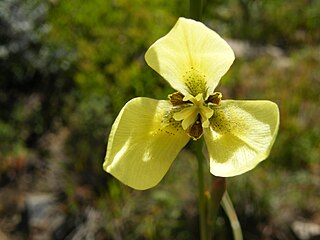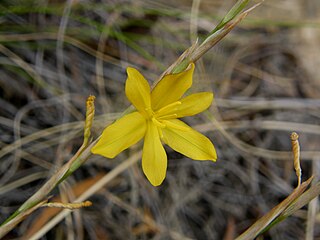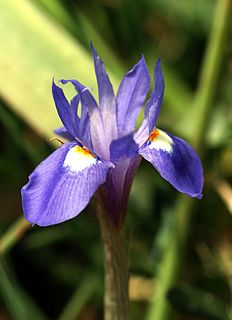
The tricolored heron, formerly known as the Louisiana heron, is a small species of heron native to coastal parts of the Americas; in the Atlantic region, it ranges from the northeastern United States, south along the coast, through the Gulf of Mexico and the Caribbean, to northern South America as far south as Brazil. In the Pacific region, it ranges from Peru to California, but it is only a nonbreeding visitor to the far north.

Dietes is a genus of rhizomatous plants of the family Iridaceae, first described as a genus in 1866. Common names include wood iris, fortnight lily, African iris, Japanese iris and butterfly iris, each of which may be used differently in different regions for one or more of the six species within the genus.

Moraea, the Cape tulips, is a genus of plants in the family Iridaceae, first described as a genus in 1758. The group is widespread across Africa, the Mediterranean, and central and southwestern Asia. The genus name is a tribute to the English botanist Robert More.

Moraea bellendenii is a species of plant in genus Moraea that was named after John Bellenden, the English botanist.

Moraea aristata is a species of flowering plant in the family Iridaceae. It is referred to by the common names blue-eyed uintjie or Blouooguintjie in Afrikaans and is a critically endangered species of plant in the genus Moraea, that is endemic to the city of Cape Town and is now restricted to the grounds of the Observatory in the Cape Town suburb of Observatory.

Moraea flaccida commonly known as the one-leaf Cape tulip, is a bulb native to South Africa, including in Fynbos habitats.

Moraea gawleri is a species of plant in the family Iridaceae. The majority of it's range lies around Western Cape province of South Africa, however it has also been recorded as far as Namaqualand to Humansdorp in the surrounding provinces.

Moraea macronyx is a species of plant in the family Iridaceae. It is found in Western Cape, South Africa.

Moraea gigandra is a species of plant in the family Iridaceae. It is found in South Africa.

Moraea fugacissima is a plant species in the family Iridaceae.

Moraea lewisiae is a plant species in the family Iridaceae.

Moraea miniata is a plant species in the family Iridaceae.

Moraea ochroleuca is a plant species in the family Iridaceae.

Moraea setifolia is a plant species in the family Iridaceae.

Moraea spathulata is a plant species in the family Iridaceae.

Moraea virgata is a plant species in the family Iridaceae.

Moraea sisyrinchium, the Barbary nut, is a species of flowering plant, a dwarf iris, in the genus Moraea, native to southern Europe and the Mediterranean region.

The von Linné family and Linnaeus family was the family of the renowned botanist, zoologist, taxonomist, physician and formalizer of the binomial nomenclature, Carl Linnaeus, and a Swedish noble family, ennobled on April 20, 1757, by the Swedish King Adolf Frederick, introduced at the House of Nobility in 1776. The von Linné family is predominantly famous for its contributions in the fields of science. The von Linné family descends from generations of priests and peasants in the historical province of Småland. The noble family's coat of arms prominently features a twinflower, one of Linnaeus's favourite plants.

Moraea serpentina is a flowering plant species in the genus Moraea. It is endemic to the Northern Cape and Western Cape of South Africa.



















